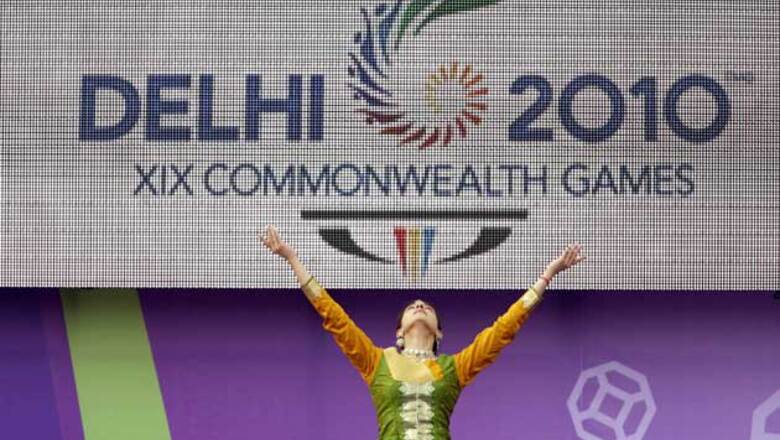
views
London: New Delhi is due to host the Commonwealth Games from October 3-14 but a number of athletes have pulled out because of health and security fears and several nations are seeking urgent assurances over safety. Following are some possible outcomes to the situation, for this edition of the Games, the future of the event as a whole and knock-on effects for other sports:
Alright on the night: There are plenty of precedents to suggest India could overcome the current problems and go on to stage a well regarded Commonwealth Games.
Athens was beset by problems in the build-up to the 2004 Olympics and while costs shot up due to delays in completing a huge building programme and implementing transport and security plans, the event itself was a big success.
The 2010 Winter Olympics in Vancouver got off to a tragic start with the death of Georgian luger Nodar Kumaritashvili and problems with tickets, transportation and the weather continued for days before compelling performances from the athletes put sport back at centre stage and silenced critics.
There is certainly heavy pressure on Delhi, particularly over conditions at an athletes' village described by Scotland's team chief as filthy and unfit for use, yet a last-minute clean-up may assuage concerns.
England's Commonwealth Games chief Sir Andrew Foster suggested a surge in manpower at the village could solve the immediate problem and it would then be up to the athletes to produce performances good enough to win back the spotlight.
Team Withdrawals: We already know a number of leading athletes will miss the Games but as yet no team has pulled out. If several high-profile nations were to decide it was not safe to be in Delhi, the Games could still go ahead but it would become ever more difficult to make sport the focus of the story. The Commonwealth Games, involving countries of the former British empire, can never match the global star quality of an Olympic Games and with Jamaica's triple Olympic sprint champion Usain Bolt among those declining to take part its status has already taken a knock.
There remain major names ready to compete but if several big nations chose to pull out entirely it is hard to see the sport commanding the attention of the world's media for long. If the focus is on the off-field problems it can cast a pall over the best of events -- just ask Vancouver organisers -- and sponsors are unlikely to be thrilled that their products are being associated with chaos and confusion rather than athletic prowess.
Games Cancellation: Australia's government gave strong support to India on Wednesday, saying it was confident preparations would be finished on time. Canada and South Africa said they remained committed to sending teams but England's description of the event as being on a "knife-edge" raised cancellation as a serious prospect.
Organisers say they are confident they can overcome what they call minor glitches but New Zealand swimmers have gone so far as to float a Plan B of a swim meet to be held elsewhere should the Games not go ahead.
Attention will now turn to Commonwealth Games Federation president Michael Fennell when he arrives on Thursday for a likely meeting with Prime Minister Manmohan Singh. Strong support from him could be crucial.
Assuming conditions at the village can be improved quickly, the biggest threat could come from a major disaster or threat of violence. A portion of false ceiling in the weightlifting venue caved in on Wednesday. No one was injured but it came a day after the collapse of a footbridge by the main stadium injured 27 workers. Those accidents, combined with the problems at the village, reports of a Dengue epidemic and the recent shooting of two foreign visitors by unknown assailants in Delhi, led to more athletes withdrawing. Any more serious incidents may be too much for these Games to survive.
Implications for future big events: Whatever happens now, Brazil can expect ever closer scrutiny of its preparations for the 2014 soccer World Cup and 2016 Olympics in Rio de Janeiro, while the implications for other developing nations bidding for major sporting events could be far reaching.
Soccer's governing body FIFA and the International Olympic Committee eschewed safer options to hand Brazil the world's two biggest sporting events but the problems in Delhi illustrate how tempting it must be to choose tried and tested nations instead. FIFA was satisfied by the organisation of the World Cup in South Africa this year -- it was no fault of the organisers that the world's best players failed to deliver on the field -- and it is widely expected that Durban will make a strong bid to host the next available Olympics.
The current problems with Delhi, however, might make some decision-making IOC members harder to convince over the country's suitability, while strengthening the case for developed nations with long track records in hosting big events.
Earlier this year, European soccer chiefs chose France to host Euro 2016 in what was seen as a safe option after the decision to award Euro 2012 to Poland and Ukraine. Organisation for that event has been plagued by delays in the buildings of stadiums, roads and hotels, especially in Ukraine.
Future in doubt: New Zealand Prime Minister John Key said on Wednesday cancellation of the Commonwealth Games in Delhi could spell disaster for the future of the event. For many critics, the Commonwealth Games is already an anachronism and the fact the Bolt, among other big-name athletes, chose to skip the competition some time ago shows that it is not the biggest draw in world sport.
These Delhi Games were supposed to be a demonstration of India's status as a growing economic and political power. If Delhi does not stage the glittering success that had been envisioned, it may be hard to persuade sponsors, television companies, media and athletes that the Games deserve their attention in the future.













Comments
0 comment